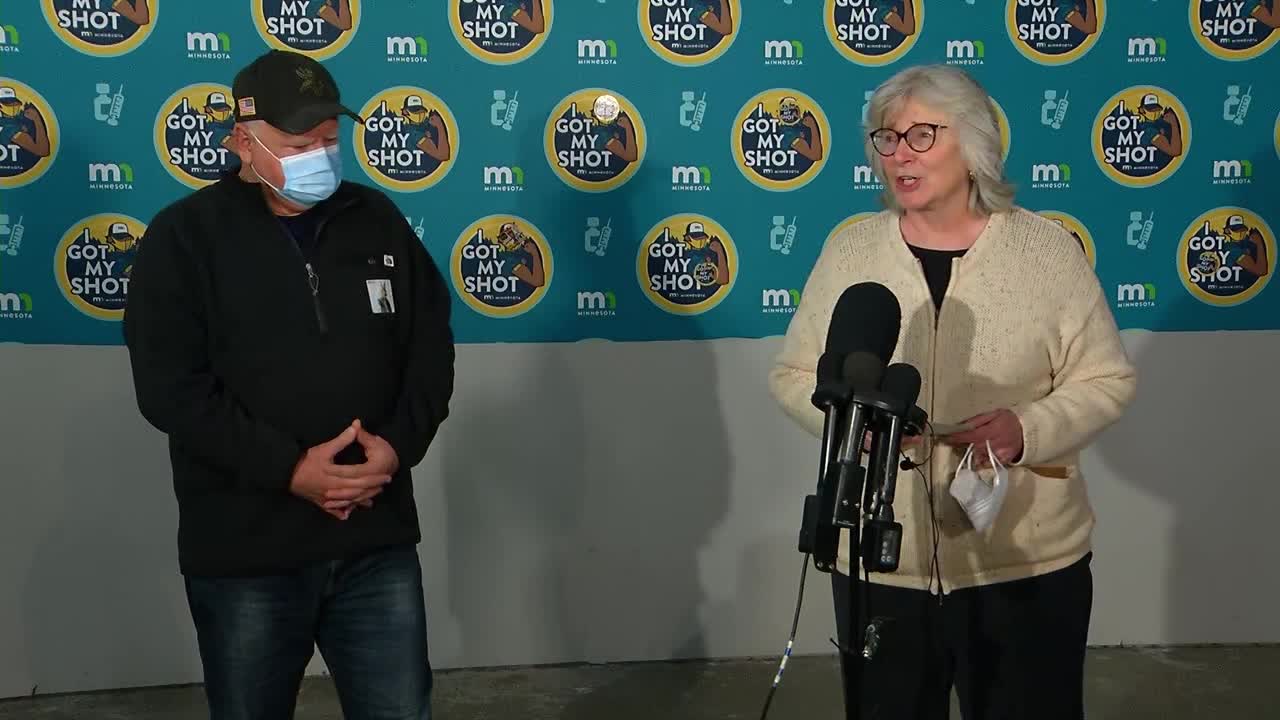‘People still need to be diligent.’ A new approach in coping with COVID-19 in Minnesota
[anvplayer video=”5155246″ station=”998122″]
With 2023 a matter of hours away, there’s a new approach in coping with COVID in Minnesota.
Dr. Beth Thielen — an M Health Fairview infectious disease physician, says we’re getting insights on how to treat COVID-19 in the future.
“I think prudence, precaution, but not panic is sort of what’s called for at this moment,” she explains. “I think it’s probably a reasonable time to think about moving more into a standard care model — and less of an emergency centralized vaccine delivery system.”
One sign of that change: the shutdown of the health department’s COVID vaccination clinic at Mall of America.
“One in every 50 vaccinations received in Minnesota come from this site,” declared Governor Tim Walz.
Walz and outgoing health commissioner Jan Malcolm were on hand to see the last of the 236,000 people getting their shots.

Gov. Tim Walz and Health Commissioner Jan Malcom speak at the Mall of America ahead of the closure of a COVID-19 vaccine clinic (KSTP).
She says how COVID vaccines are delivered is changing — from large public clinics, to pharmacies and health care providers.
Malcolm also notes that state-run testing sites will stay open for a few more weeks before closing.
“We’ve seen the volume of services delivered at sites like this decreasing quite steadily,” Malcolm told reporters. “There is plenty of vaccine out there now. This has been a wonderful convenient site, but the good news is, it’s very easy to find vaccines in our pharmacies and health care systems.”
The specific strain of COVID found in the metro is also changing.
Data from the Metropolitan Council says the latest wastewater testing shows BQ.1 — an omicron sub-variant — accounts for 63% of the viral material entering the Metro Plant — and it’s trending upward.
“Is it concerning? Yes,” Thielen says. “Because I think it has important implications for vaccine immunity and for the therapies we choose.”
She says the medical community has been aware of BQ.1 since November.
Thielen explains when a viral strain is matched to a vaccine, the protection is better.
But she’s confident the new bivalent vaccines are effective, even when there’s not an exact match.
“We certainly have seen that throughout the pandemic,” Thielen says. “We’ve seen some degree of protection from illness even with mismatched viruses, and still, we’re seeing quite good protection of the vaccine against severe disease.”
Walz says Minnesota will continue to promote COVID vaccinations during the transition to private sector providers.
He adds we are not done with COVID — but that it’s moved to a “more endemic state.”
He urged Minnesotans to get their booster shots.
“Please get your boosters,” the governor said. “These vaccines are amazing. They’re able to be tailored to the emerging variants that are out there.”
All this — as the U.S. is issuing new restrictions on air travelers from China — now dealing with a COVID surge.
The CDC says starting Jan. 5, anyone two-years-old and older will need to provide a negative COVID test.
Dr. Zeke McKinney — a Healthpartners physician, says it’s not just about COVID.
He points out that flu and RSV have been on the rise this year.
This is no time, he says, to let your guard down.
“I think people still need to exercise caution when it comes to travel and gathering,” McKinney advises. “I think people still need to be diligent, and take some lessons we learned from COVID. Keeping your hands clean, maybe wearing a mask when you’re sick, or in general when you’re going out, would be a good idea.”